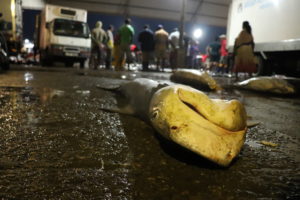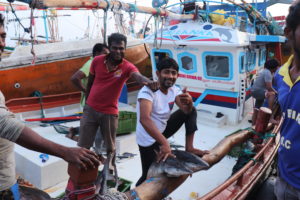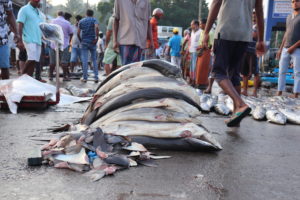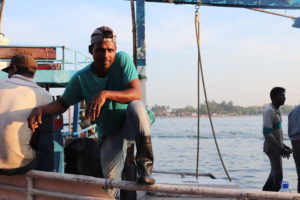For Shark Awareness Day 2019 we have been to talking to some of our elasmobranch (that’s sharks, skates and rays) researchers! Here, University of Exeter PhD student Claire Collins tells us about her research in Sri Lanka working to understand the shark fishery there so we can better manage them.

Tiger shark awaiting sale by shark traders in the early morning
Words by Claire Collins, University of Exeter PhD student.
I am 2nd year PhD student studying the socio-economic context of pelagic fisheries in Sri Lanka and India, specifically distant water vessels that target sharks (along with other large pelagics). As part of my research I will study the socio-economic value chains associated with sharks, the spatial movements of vessels and the perceptions of fishers with regards to national and international conservation regulations. To do this I will use a variety of methods including landing surveys, focus groups, household surveys and observational data. It is hoped that at the end of the project we can understand more about what motivates fishers to target sharks in distant water areas and how policy and management can be improved to benefit fishers’ livelihoods and shark populations.
Sharks are threatened globally by both targeted fisheries and through accidental capture in other large pelagic fisheries. Understanding the impact of anthropogenic activities is important and relies on accurate landings and discards data. However, for many fisheries globally the status of sharks as bycatch, and the difficulties in identifying them to a species-level means that we don’t have a clear idea of levels of fishing. The Indian Ocean has been identified as an area where populations of sharks are particularly poorly understood. As part of my PhD project I will be focusing on collecting data on landings and discards of sharks, as well as fishers perceptions of their livelihoods as shark fishers and how management and regulations effects them. One way to collect this data is through landing surveys in markets. These surveys are dual purpose for us, as we are able to collect landings data (including information on price and who is buying them) and we also get to speak to people whose job it is to understand shark movements and populations; the fishers!

Fishers with sharks caught incidentally during fishing for large pelagics such as Tuna and Billfish
Market surveys are not for the faint-hearted as they are frantic, start incredibly early (3AM at one of our sites) and the resulting smell means researchers are often unsuitable for travelling on public transport/sitting in cafes afterwards! Upon arriving at the markets researchers familiarise themselves with fishers and traders and look out for the first landings of the day. In order to understand value chains associated with sharks the team collect weight and price information for each species of shark landed that day, along with the details of which individuals are selling and buying them. Sales are conducted quickly and sharks often disappear seconds after being offloaded, therefore researchers need to be quick and rely on their good relationships with traders and buyers. Within Sri Lanka shark fisheries are considered zero wastage, therefore the team has to collect price and weight data for the sales of meat, fins, liver, teeth/jaws and skin as well as whole sharks.

Meat and fins are separated for sale on the market side.
Our research team also conduct questionnaires with fishers that are landing to the markets on the subject of their fishing behaviours, attitudes towards sharks and the economics of their recent trip. These surveys are conducted by researchers with the captains of the vessels, often in the wheel-house, and tablets are used to help speed up recording and analysis. By combining data from both types of surveys, as well as interviews with other individuals such as shark traders, we can map out socio-economic reliance on shark resources. This will help us to understand likely impacts of changes in management and policy interventions on a national and international level. It could also offer policy-makers an insight into how fishers see their industry and livelihoods and what is important to them for the future.

Fishers are regularly gone for trips of over 2 months
All images taken by the author. This work is supported by the Bertarelli Foundation as part of the Bertarelli Programme in Marine Science and is conducted in partnership with the Zoological Society of London.
You can follow Claire on Twitter.
#ExeterMarine is an interdisciplinary group of marine related researchers with capabilities across the scientific, biological, medical, engineering, humanities and social science fields.
Find us on: Facebook : Twitter : Instagram : LinkedIn
If you are interested in working with our researchers or students, contact Michael Hanley or visit our website!
